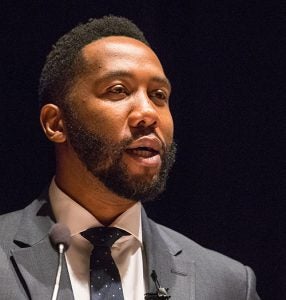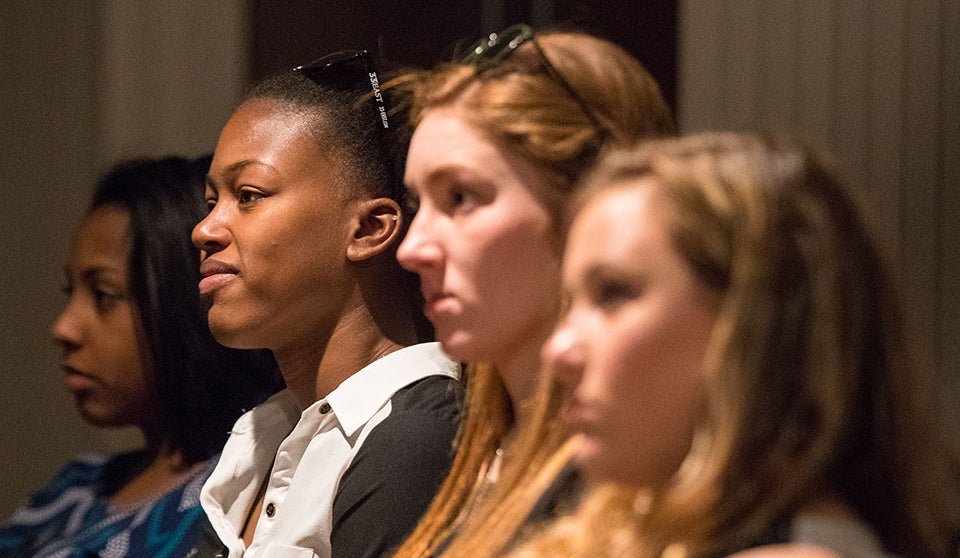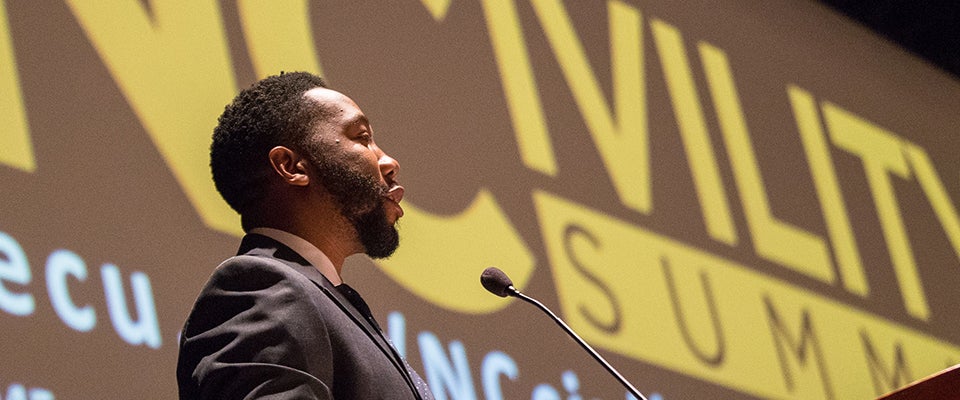ACTION AND PASSION
Ndaba Mandela headlines N.C. Civility Summit
Ndaba Mandela, the grandson of South African leader Nelson Mandela, spoke at East Carolina University Feb. 18, urging the students in attendance to be active participants in making the world a better place.
Mandela’s address led off the 2017 N.C. Civility Summit, an event aimed at engaging in dialogue, building coalitions and enacting change.
Born in South Africa under apartheid, Ndaba Mandela related how he did not meet his grandfather until visiting him in prison. He described his upbringing in privileged South African society, attending good schools and mingling with white people in daily life.
Following the death of his parents to HIV/AIDS, Mandela said his grandfather insisted that the cause of their deaths would not be concealed or minimized, and it was the first time a prominent family had admitted a loss to the disease. Mandela became a global ambassador for the United Nations’ HIV/AIDS awareness campaign.
In traveling the world, he said, he realized the extent to which the world’s knowledge of Africa was limited to war, poverty, disease and dictators. “The only positive was safari; animals were the most important thing about this continent of over a billion people.”

Mandela spoke on the importance of service, of understanding and of taking action to effect change.
Deciding enough was enough, he set out to do something about the misconceptions of Africa, and eventually established the Africa Rising Foundation, working with people at the grassroots level to address Africa’s challenges.
Mandela encouraged the attendees to dream big — “If your dreams don’t scare you,” he said, “you’re not dreaming big enough.” But it also takes action, he said, because a dream without action will not accomplish anything.
“Each of us has the potential to achieve greatness in our own way,” Mandela said, but to achieve greatness you must have passion for what you do.
“It is in our hands to make this world a better place,” Mandela said to close his remarks.
He then took questions from the audience, continuing to advocate service to the community, leadership and understanding of the experiences of others.
“To serve is to understand,” he said. “You cannot call yourself a leader today if you do not serve.”
Following Mandela’s address, the students participated in discussions of gender equality, race relations, the global community, LGBT issues and community activism.
Bone Masala, a finance student originally from Botswana, said Mandela had given her a lot to think about. “I learned about what I can do to make a difference,” she said. “I have a lot of ideas, but … I don’t know what to do. I didn’t know how many others think the same way, and I got to realize that today.”
Masala said she was particularly interested in the LGBT discussion because that issue is not yet at the forefront in her home country. “Maybe it’s somewhat my calling to try and sensitize people to this, to tell people that it’s okay to be gay.”
Shabree Bost, a member of the Ledonia Wright Cultural Center’s cultural programming board, said the keynote speaker was a good fit for the N.C. Civility Summit because of his message of equal treatment for all people. “The Civility Summit aims to speak on things that happen in society and how everyone isn’t treated the same,” she said. “We would like to get to that place at some time in history.”
The students in attendance at the event are already on the right path toward one part of Mandela’s message — to take advantage of their time at ECU to learn about other cultures, he said.
“Take this opportunity to get to know somebody that you otherwise wouldn’t,” he said. “And challenge the institution to make sure to provide the platform for students to learn about different cultures.”
Dr. Erik Kneubuehl, associate vice chancellor for student engagement and involvement, said the summit was a success, with more than 150 students in attendance.
“It demonstrated that no matter what side of an issue you are on, the only way to a solution and ultimately change is through civil discourse,” he said. “Mr. Mandela went above and beyond our expectations in articulating the concepts of service, leadership and community transformation, East Carolina’s three commitments.”

Following the keynote address, students attended discussions of topics such as race, gender, class and activism.
